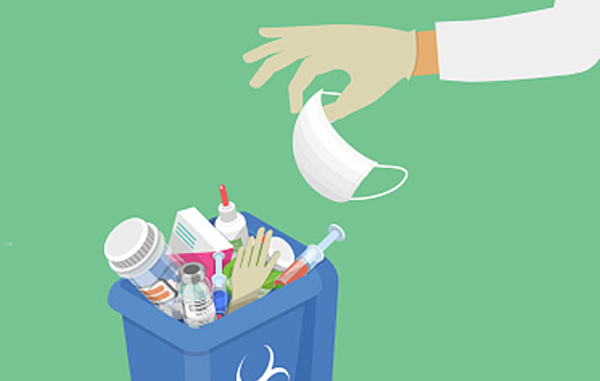Liberty University School of Health Sciences welcomed Johns Hopkins University Professor of Surgery Dr. Marty Makary to campus on Sept. 14 to share on prevalent issues within the healthcare industry, such as the extreme costs of healthcare and insurance and the importance of challenging current scientific misconceptions. Makary serves as the chief of Islet Transplant Surgery for Johns Hopkins. He is a leading healthcare expert, a Fox News contributor, and a New York Times bestselling […]
Read MoreMedical Waste
Kaiser Settles for $47 Million Over Dumping Medical Waste
On Sept. 8, with six district attorneys, California Attorney General Rob Bonta announced a settlement with Kaiser Foundation Health Plan, Inc., and Kaiser Foundation Hospitals resolving allegations that the healthcare provider unlawfully disposed of hazardous waste, medical waste, and protected health information at Kaiser facilities statewide. As part of the settlement, Kaiser will be liable to pay up to $49 million and required to take steps to prevent future unlawful disposals. Kaiser: Will pay $47.250 […]
Read MoreLooking for Professional Medical Waste Solutions? Get Your Customized Quote Today!
At Waste Medic, we understand the diverse needs of organizations when it comes to regulated medical waste disposal, sharps management, pharmaceutical waste compliance, and more. We’re here to provide you with tailored solutions that instill confidence in your waste management processes. Medical waste generation can vary significantly between organizations, but having a reliable plan for biohazardous waste disposal is essential. Our team of experts is dedicated to addressing both your regular waste management needs and […]
Read MoreImproper Disposal of Medical Waste Costs Health Systems and the Environment
Health care is a major polluter both in terms of emissions and contributions to landfills. The combined health sectors of the United States, Australia, England, and Canada emit an estimated 748 million metric tons of greenhouse gases each year, more than all but the six top polluting countries in the world. Meanwhile, a report on 110 Canadian hospitals published in 2019 found those institutions generated nearly 87 000 tons of waste annually — roughly the […]
Read MoreHas the Time Come for a Medical Waste Audit at Your Organization?
Health care organizations and medical professionals have shown a strong interest in reducing their greenhouse gas emissions. Integrating sustainability into all aspects of a hospital’s mission takes focused commitment across the organization, as Massachusetts General Hospital (MGH) leaders can attest. Two years ago, MGH launched its Center for the Environment and Health. The center integrates sustainability into MGH’s clinical, research and educational activities and is designed to improve the environmental health of the hospital and […]
Read MoreExamining the Impact of Medical Waste Management Policies
As we sail through the digital age, a new frontier has emerged in the realm of environmental protection—the online sphere. This vast interconnected landscape has become an essential catalyst in propelling discussions about various environmental issues, and medical waste management sits at the forefront of these conversations. Given the tremendous environmental repercussions associated with mishandling medical waste, it is imperative to address this issue head-on. In this article, we will explore the intricate dynamics of […]
Read MoreMedical Waste Company Sues Sanford Health over Human Torso Found in Plastic Container
A medical waste company has filed a lawsuit against Sioux Falls, S.D.-based Sanford Health, alleging the system planted a human torso at the facility. The plaintiff, Monarch Waste Technologies, disposes of Sanford Health’s medical waste. It is suing Sanford and Healthcare Environmental Services, a company overseen by the health system, for inappropriate handling and delivery of regulated medical waste. The lawsuit alleges HES delivered a “human torso in a sealed plastic container” to Monarch, and […]
Read MoreExamining the Impact of Medical Waste Management Policies
As we sail through the digital age, a new frontier has emerged in the realm of environmental protection—the online sphere. This vast interconnected landscape has become an essential catalyst in propelling discussions about various environmental issues, and medical waste management sits at the forefront of these conversations. Given the tremendous environmental repercussions associated with mishandling medical waste, it is imperative to address this issue head-on. In this article, we will explore the intricate dynamics of […]
Read MoreWhy Is OSHA Still Pushing Emergency COVID Standards?
The COVID public health emergency ended in May, yet OSHA’s Emergency Temporary Standard for healthcare facilities continues. Most people are pleased to see the COVID health emergency in the rearview mirror, including the administration that ended the public health emergency on May 11. However, there’s one agency that believes we’re still at the outset of the COVID pandemic. Back on June 21, 2021, the U.S. Department of Labor’s Occupational Safety and Health Administration (OSHA) issued […]
Read MoreOSHA Wants Input on Protecting Health Care Workplace Violence
OSHA is requesting feedback as it considers developing a standard aimed at preventing workplace violence in the health care and social assistance industries. The agency is accepting until July 3 comments regarding a Small Business Regulatory Enforcement Fairness Act panel report on the potential standard, as well as other documents related to options OSHA is considering. The panel met multiple times from March 1 to May 1, discussing control measures and hazard assessments related to […]
Read More








